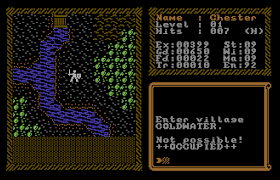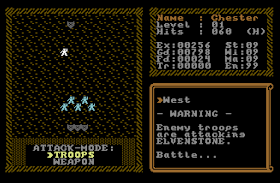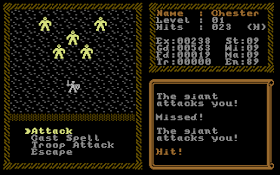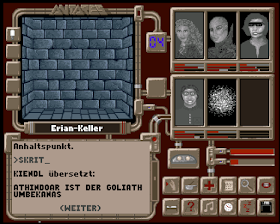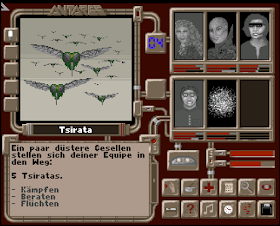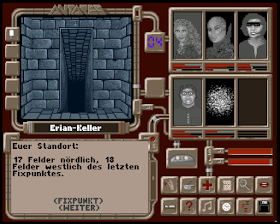 |
| I come across Lord Marox's castle, Magnar. |
The Ormus Saga
Germany
Germany
Mike Doran (developer); CP Verlag (publisher) on Golden Disk 64; may have had prior independent distribution
Released either 1991 or 1993. Sources vary.
Date Started: 22 July 2015
Date Ended: 28 July 2015
Released either 1991 or 1993. Sources vary.
Date Started: 22 July 2015
Date Ended: 28 July 2015
Total Hours: 13
Reload Count: 12
Difficulty: Moderate (3/5), aside from not being able to win
Final Rating: 21
Final Rating: 21
Ranking at Time of Posting: 50/193 (26%)
Well, after dedicating an absurd amount of time to The Ormus Saga over the last couple of days (time that I've been in New Orleans, I should add, to enhance the absurdity), I have to declare defeat. Despite visiting, re-visiting, and re-re-visiting all of the game's locations, I still can't find the bit of information that gets me to the endgame.
On the positive side, I've effectively neutralized Lord Marox even if I haven't been able to kill him. First, I re-conquered all of the cities that he'd captured, and I used my funds to install garrisons that defeat all his attempts to re-take them. Second, I conquered his city and looted everything except what's behind a locked door I can't open. Third, I killed all his advisors. All that's left is an immortal old wizard grousing about how important he is.
 |
| Show, not tell, Marox. |
The path to winning The Ormus Saga involves visiting the game's various menu towns, cities, cottages, castles, towers, and dungeons and finding a selection of information and artifact items that trigger subsequent stages in the sub-quests. So a visit to Harper Valley results in some information about the location of a treasure chest. Inside the chest is a book that must be gathered with four other books and given to an NPC to get a golden key. The golden key unlocks a door that has a scroll behind it--one of six scrolls you need to get the Amulet of Fire. And so on to the endgame. Naturally, you'd have to be awfully lucky to visit all the locations in the "right" order at the outset, so you have to backtrack a lot. Nothing in the game tells you the number of towns, towers, etc. (one NPC does tell you the number of dungeons), so if you miss one in your explorations, you're in trouble.
 |
| Exchanging one quest item for another. |
Here's where I'm stuck: to get into the World of the Dead and smash Marox's Gem of Power, I need three amulets. One of them, the Amulet of Wisdom, is in the possession of King Argon, and he'll only give it to someone who brings back his crown, which Marox stole. The crown, meanwhile, is behind a locked door in Marox's castle, and a single NPC line says that I need the "Staff of Marox" to get through the door. I've received no other information about the staff, and I haven't been able to find it anywhere in the game.
Even then, we have the problem of the Amulet of Death, which is supposedly held by Marox's archdaemon servants. I've been told that I need to kill all three of them to get the Amulet. The problem? Marox only has two archdaemon servants. I've killed both, and nothing happens. I even killed some hapless villager, thinking he might be the third in disguise, to no avail.
 |
| In a game where you can dig for treasure in the middle of the ocean, anything is possible. |
Thinking I'd missed something, I revisited all the locations, talked to all the NPCs, and searched everything, but nothing new emerged. Googling, I found this one German site that lists all the location coordinates in the game, but I'd already been to all of them. So I don't know what to do barring a visit from the developer or someone who's won the game.
A few other things discovered since the last time:
- Purchase prices for weapons, armor, troops, and other items are randomized each time you visit the merchant (within a set range, I guess). If you don't like the price, leaving and returning gets you a better deal.
- Better armor seems to reduce damage rather than the likelihood of a hit. This makes sense to me, but almost all RPGs do it the other way.
- Last time, I talked about weapons, armor, and shields breaking as scripted events. It's even worse than I thought. The game doesn't care which item breaks; it only knows that the next combat you fight, against whatever foe, #&*$ you, your weapon is going to break. That means that if you're unhappy that your expensive Death Sword just shattered, you can reload, equip some lesser weapon, fight your combat, and have that break instead.
 |
| That 22 gold wasn't worth a suit of magic armor. |
- You can "send troops" to any city at any time, and they arrive instantly. A player with low integrity might wait and see what cities Marox attacks, reload, and send troops to the city in anticipation of his arrival.
- Sometimes the locations of chests aren't delivered in plain coordinates. One required me to solve an algebra equation.
- If you attack and kill NPCs, really nothing happens except that you can't talk to them any more. Two towns allow you to purchase resurrection for any slain NPCs. There are a handful of NPCs that start the game dead, and you have to pay for the resurrections (or cast the spell yourself) if you want to talk to them.
- Raising experience levels turned out to be a matter of visiting one of the game's three temples and praying. Leveling up is accompanied by +1 strength, +3 wisdom, and 30 hit points.
 |
| Leveling up in a temple. |
- I never did much with spells in the game, save CURAX ("cure poison"). Most of them simply duplicate items in the game, like maps and torches, and the more powerful ones cost a lot of money.
- A couple of enemies--wizards and demons, at least--can cast spells, which absolutely waste you (like -75% of your hit points) until you find the Mystic Helm, at which point the spells do nothing at all. Annoyingly, enemies who cast a spell still get a physical attack following the spell. It feels like the spell ought to have been their entire turn.
 |
| Ha, ha, demon! |
In the last post, I had talked about the difficulties associated with methodically exploring a top-down, tile-based game world. This became a lot easier once I bought my first ship. Ships in The Ormus Saga don't work like they do in Ultima, in which you have to remember where you left it. Instead, ships here are just inventory items that you "board" any time you need them and apparently pocket the moment you hit land. Maybe your troops are meant to be portaging them or something. The upside is that once you have a ship, you can explore the map in fixed ribbons, occasionally having to move around a mountain peak.
 |
| Boarding a ship near an island temple. |
Ships have a damage rating that doesn't have anything to do with actual damage (which doesn't exist; you can't fight ship battles in the game) and seems more like a simple counter of how many times you've boarded them. Every time you board, the condition goes down by 1. Eventually, you have to "repair" them in one of the harbor towns, which costs the same amount whether you're repairing 1 damage or 99 damage.
Let's see how she rates:
- 2 points for the game world, which mostly clones Ultima. It's not hard to see Mondain in Morax or Mondain's Gem of Immortality in Morax's Gem of Power. I did like some of the little allusions in Ormus, such as the deceased hero Lord Thorn or the Dragonwars, but it never came to much. There might have been more in the original documentation.
- 2 points for character creation and development. There are no choices during creation. You have some traditional experienced-based leveling, but I never really felt that the character was getting more powerful from these level-ups.
- 3 points for NPC interaction. Talking with NPCs is a vital part of the game, but also a bit boring since you have no dialogue options and they're all menu-based, so there's no joy of finding that obscure NPC hidden behind a secret door.
 |
| Marox's counselor demonstrates a poor understanding of the term "secret plan." |
- 1 point for encounters and foes. Enemies in the game vary only by icon and hit points. A couple can cast a single damaging spell.
- 2 points for magic and combat. Both combat systems are just silly and offer no tactics whatsoever. The magic system is...there.
- 3 points for equipment, a decent selection of weapons, armor, and shields of increasing benefit. There are other utility and artifact items that are fun to find.
 |
| Some of the special items in my late-game inventory. |
- 4 points for economy, a strong point in the game. With the need to constantly replenish troops, broken equipment, and spells, you never feel too rich. Rewards from exploration and combat seem pitched just about right.
- 2 points for a main quest of multiple stages, but no side-quests or role-playing.
- 1 point for graphics, sound, and interface. I can't forgive the joystick-only interface, especially on a game designed for only one platform. The graphics are poor even for an Ultima clone, and there's no sound at all.
- 1 point for gameplay. It gets that bit of credit for non-linearity, but the game is way too long for the experience that it offers.
I've declined to subtract points for the crashes and freezes just because I think those are more likely emulator issues than original programming issues. That gives a final score of 21, which seems a bit high to me, but then again, I did play it for 6 hours straight the other night, so it must have some appeal. The more important thing is that it's 13 points lower than the original Ultima from 10 years prior.
Online databases offer contradictory information about the game, and it's unclear where they're getting all of it. For instance, most sources give 1991 as the release date, but the only sure mechanism of publication that I've found is the August 1993 issue of Golden Disk 64. It's possible that the developer released it through independent channels before the diskmag release.
Everyone seems to agree that Mike Doran wrote the game, but some sources give a co-developer as Andrea Metzner. I haven't been able to track down either of them. I don't even know what nationality they are. The more important news from the online databases is that The Ormus Saga is actually a remake: Doran's first game seems to have been Ormus (1990), a more primitive, all-text version of The Ormus Saga. It offers dialogue via keywords, as in Ultima IV, rather than just an information dump. In the same way, Ormus II (1991) seems to be an earlier all-text version of The Ormus Saga II. There are other games, for which I've only seen pictures of the box, called Stories of Beryland I and II; I have no idea what the dates are on these, but they may just be compilations of the Ormus games.
 |
| Exploring Remfield in the original Ormus (1990). |
I admire Doran's dedication to developing his setting, but I can't claim to be overly enamored with the result. I give a pass to independent games for not featuring the same quality of graphics and sound as their commercial counterparts, but there's less of an excuse for such primitive gameplay. The thing I expect most from independent games--from any games, really--is a sense of self-awareness. If you can only program menu towns (hell, menu dungeons), primitive combat, and half a dozen monster icons, fine--but you don't have a 10+ hour game. You have a 4-hour game. Don't give me Ultima I's complexity (less than that, really) and Ultima V's size and length. John Carmack is a good example of a developer who had this self-awareness and designed games (Shadowforge, Wraith, Dark Designs) that were about the right length, difficulty, and complexity given what he was able to program. The developers of Dragon Sword and The Ormus Saga are something of the opposite.
It's clear that The Ormus Saga II: Guild of Death (1993) and The Ormus Saga III: The Final Chapter (1994) are more advanced games (they seem to have explorable towns, at least), so in that sense I look forward to seeing how the games progress. In the meantime, perhaps someone will come along and tell me what I missed to win this one.
Time to devote myself entirely to Antares for a while.






